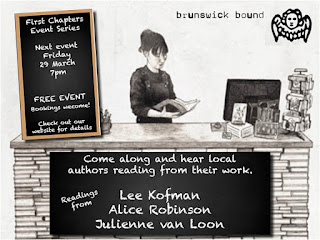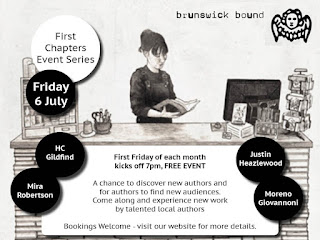First Chapters Q&A with Julienne van Loon
Julienne
van Loon is a novelist and essayist. She
is the author of Road Story, winner of The Australian Vogels’ Award, and two
other critically acclaimed novels, Beneath the Bloodwood Tree and
Harmless.
Julienne currently
works as a Vice Chancellor’s Principal Research Fellow with non/fictionLab at RMIT University Curtin University on Australia ’s west coast.
Julienne will be reading from her first non-fiction book The Thinking Woman at First Chapters on Friday 29 March.
1. Brunswick
Bound has asked you to read a piece from your published work. Tell us
what we can expect from the piece you have chosen?
I’ll
be reading an excerpt from one of the chapters in The Thinking Woman (New South
2019). This is a book that seeks to bring the work of leading women thinkers to
a new audience and to apply their philosophical ideas to everyday life.
2. How
would you describe the kind of books that you write?
I
would describe myself primarily as a novelist working in the field of literary
fiction, but this new book of mine – The Thinking Woman – is a bold new experiment for me: it is part memoir, part
conversation, part philosophy.
3. What
was the first book that you read (or had read to you) that left an impression
on you?
A
very early favourite was the book Fireworks in series The Adventures of Wonk by Muriel Levy.
In the book the character Wonk (a koala) has a misadventure involving a fresh
box of fireworks, with quite spectacular results. You can imagine.
4. Do
you believe that books should answer life’s big questions?
 No.
Of course, it depends on the genre, but, as a reader, one of the criterion I
use to judge a book’s success is whether it prompts interesting questions.
These questions might be large or small. What I’m suggesting is that posing
questions is part of the art of literature. If I was reading a book on how to
fix a toilet, I’d want answers, but in the realm of literary fiction or the personal
essay, I want to be prompted to pose my own questions as a reader and walk away
from the text not quite finished with the project of attempting an answer to
them.
No.
Of course, it depends on the genre, but, as a reader, one of the criterion I
use to judge a book’s success is whether it prompts interesting questions.
These questions might be large or small. What I’m suggesting is that posing
questions is part of the art of literature. If I was reading a book on how to
fix a toilet, I’d want answers, but in the realm of literary fiction or the personal
essay, I want to be prompted to pose my own questions as a reader and walk away
from the text not quite finished with the project of attempting an answer to
them.
5. Do
you have any writing quirks?
I
often have trouble spelling the word tomorrow, LoL.
6. What
is your favourite word or phrase?
I
couldn’t commit to a favourite. I love language in its messy entirety.
7. What
have you found most surprising about publishing a book?
The Thinking Woman is my fourth book.
When I published my first one (Road Story,
which won The Australian/Vogel’s
Award in 2004), I was simply surprised that people read it and that they formed
their own understanding of what they had read, and wanted to share that
experience with me and with others. Writing fiction is quite an isolating
experience. You’re very much in your own world. And with the publication of Road Story
I was shocked that the characters I’d lived with in my own head for so many
years suddenly inhabited other people’s heads too. That’s the surprising beauty
of publication.
With
The Thinking Woman the writing
process has been quite a bit more collaborative, as the book is based to a
significant extent on conversations I’ve had with leading women thinkers, and
so that’s been a very different process and a new kind of writing process for
me. And yet, I’m still surprised now that the book is published that readers are
coming across it and making it their own through reading. That they sometimes
come to me as the author to share that experience is a little bit magic.
Readers bring a lot to a book. I love that about readers!
8. What
is the question that you hope never to be asked in an author Q&A?
If
I had such a question in mind (which I don’t), why would I put it out there?
That would be like a dare. I’m not going to pre-empt such a thing by thinking
it up.
9. What
question do you hope you will be asked and why?
I
don’t know. See my answer for Question 8. I don’t want to limit the
possibilities.
10.
Which author that you have read do you think should be better known or more
widely read?
Oh,
there are many! Firstly, all of the women in The Thinking Woman: Siri Hustvedt, Laura Kipnis, Marina Warner,
Nancy Holmstrom, Rosi Braidotti, and Julia Kristeva.
In Australian children’s fiction: Gabrielle Wang. You can find out more about the First Chapters event series on the Brunswick Bound website.




Comments
Post a Comment